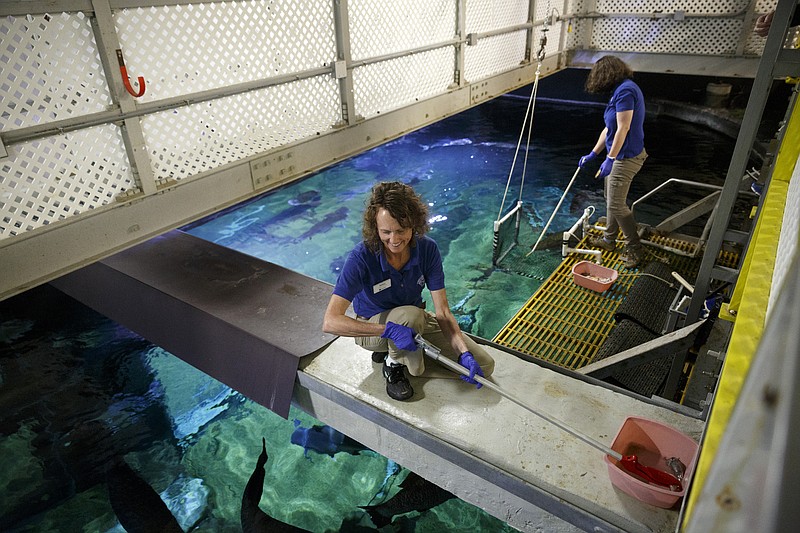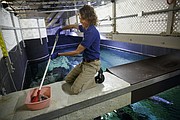More to explore
See GPS coordinates from the Tasha Skillman and Nikki Eisenmenger trip to Guyana here.See footage of arapaima in the Tennessee Aquarium at this link.
Not much is known about arapaima, and it's easy to understand why considering the journey Tennessee Aquarium aquarists Tasha Skillman and Nikki Eisenmenger took to study one of the world's largest species of freshwater fish.
It took two flights, a truck ride and another two-hour car ride for the duo to reach the heart of the South American nation of Guyana, where the world's largest density of arapaima roam the remote waters of the Rupununi River.
From there, Skillman and Eisenmenger traveled 75 more river miles, working with renowned conservation biologist Lesley de Souza on the trip of a lifetime to learn more about the arapaima they work with at the Tennessee Aquarium.
"We kind of live and breathe these animals," Eisenmenger said. "We're a little obsessed with them, and to get the opportunity to see them do what they do in that environment, it was extremely cool."
There are six arapaima among the river giants at the aquarium. Eisenmenger and Skillman have been working with them for years, training them to swim voluntarily onto a stretcher that can lift the fish out of the water for examination.
When the opportunity to apply for a professional development grant arose, the two pitched the idea for their trip and won $2,000, which they paired with some of their own money to fund the 15-day excursion they returned from earlier this month.
Skillman and Eisenmenger learned about more than just the arapaima, though. They learned about a culture and its dependency on the fish.
Arapaima are an endangered species, but with de Souza's help, their numbers are much higher today in Guyana than they were just a few years ago.
Rather than relying on poaching for income, the culture along the Rupununi River has changed to promote recreational catch-and-release fishing that provides equal financial benefits to the area. Locals taught Eisenmenger and Skillman to fish on the trip.
"What we really were drawn to," Eisenmenger said, "is not only is Lesley helping the animals, she's helping the people."
Eisenmenger and Skillman stayed at three campsites along the river during their trip. They would go out early in the mornings and work with arapaima, return for a nap in the middle of the day and go back out at night.
"We saw them nest for the first time and learned about their parental care," Skillman said.
The $2,000 grant was funded by former aquarium volunteer Arthur McFadden, a longtime supporter who died last month. In lieu of flowers, his family asked for donations to the Arthur McFadden Professional Development Award to support other educational and professional experiences like those for Eisenmenger and Skillman.
"We learned how they handle [arapaima] in the wild and how we can translate that here to the aquarium with what we're doing and how we handle the fish," Skillman said. "It was very eye-opening, and we learned a lot."
Contact staff writer David Cobb at dcobb@timesfreepress.com or 423-757-6249.

